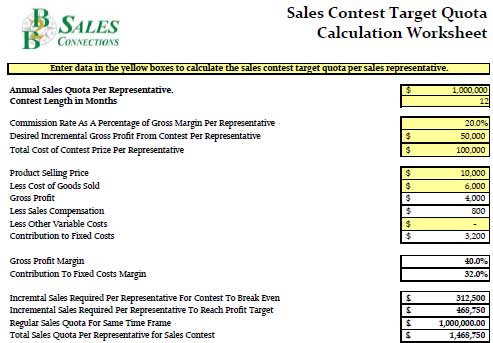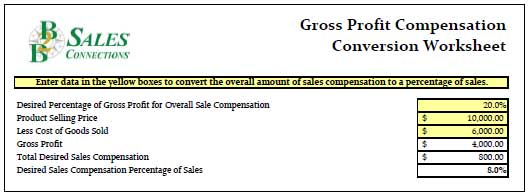Why do sales contests fail? That’s a question asked by many sales managers.

The problem is that they ask it after their sales contest is finished. In reality though, if they had designed their contest with the 5 keys to an effective sales contest in mind, they wouldn’t need to ask the question in the first place.
Sales Contests – A Common Management Tool
Sales contests are extremely common tools used by sales managers. In fact, you would be hard pressed to walk into any sales office and discover a sales manager who is not running some sort of contest to motivate their team to increase productivity. You probably won’t find any of the two contests exactly the same either.
Why not run a sales contest? They’re always fun, rewarding, a good change of pace from the every day routine, and they always make money, right? Wrong!
Before you jump in with your check book wide open, the fact is not all sales contests motivate, and not all are profitable. In fact, if not designed properly, contests can do more harm than good.
Why Sales Contests Fail – Mistake #1
The biggest mistake you can make as a sales manager is to design a contest that only has a single winner. In fact, in my opinion, this is the biggest reason why sales contests fail.
Having experienced these contests both as a direct sales representative and as part of a management team, a “winner takes it all” qualification should be avoided at all costs, and I say that from the point of view of a multiple winner!
The reason is that these contests tend to be won by the same sales representative time after time. The feeling on the team then becomes “why should I put the extra effort in, Sam always wins anyway.” Even if the contest is more competitive with different representatives having a chance to win, if someone gets out to an early lead, others will stop competing if they think the lead is insurmountable. Either way, the contest that was supposed to create fun and increase motivation has actually done the complete opposite.
Can Everyone Win?
Some managers have tried to alleviate this problem by having contests where the top three or top five sales representatives all win. In reality, where ever you draw the line, the same issues exist. In this case, you may have created motivation among your top representatives to compete with one another, but what about the rest of your team? The best contests are those designed to motivate all of your representatives to compete within themselves while creating a financial benefit for the company.
How to Fix This to Make Your Sales Contest Better
Again, speaking from experience, by a wide margin, the most motivating and most productive sales contests are those where everyone on the team can qualify and win, as opposed to having just one winner. In other words, you set a target, and whoever reaches it, wins.
Not only does this keep everyone engaged in the contest longer, it actually produces more sales overall. Your top producers often end up coaching the other reps on your team, helping to bring your 80% producers to 90%, and your 90% producers to 100%, all while continuing to exceed sales qualification standards themselves. I have seen it where, over time and several sales contests, the whole team sells more on average even when you are not running a sales contest.
Why Sales Contest Fail – Forgetting Your Have Junior and Senior Reps
You may be thinking because you have both senior and junior sales people on your team, a qualification target system like this will not work in your situation. It’s true that your top producers should have to stretch to reach higher targets than those who are new to the team however, the system can still work. All you need is a handicapping system so that qualification is fair for everyone. In fact, you probably already have such a system. It’s called a sales quota.
Quota is a Great Handicap System
If your sales quotas are already adjusted based on territory opportunity, experience or previous sales results, then all you have to do is make qualification a percentage of quota. For example, everyone who reaches 110 percent of their quota wins. If your quotas are the same for everyone, then perhaps your sales contest doesn’t need to be handicapped in the first place.
Your Can Reward Sales Activities Too
If you believe your contest must be handicapped to account for the different experience levels on your team, be creative. Your contest can be based on actual sales for your senior reps, and on the daily sales activities required to generate sales for your junior reps. You can set targets for a certain number of prospecting calls or fact finding appointments within a given time frame, or you can set a specified number of new customers a sales person needs to acquire as a qualification.
Remember, where there’s a will, there’s a way. Having sales reps with different experience levels is simply not a valid reason why sales contests fail.
Why Sales Contests Fail – Mistake #2
The second biggest reason why sales contests fail is because sales managers when creating sales contests are not setting the bar high enough. They actually lose money when a prize is awarded. The goal is to make the qualification targets high enough that the sales representatives have to stretch to reach them, yet low enough that they are both attainable and profitable.
In other words, if you don’t make sure you have set the qualification bar high enough for you to realize your desired profit, net of all variable expenses, including the cost of goods, sales commissions and the incentive prize, then your sales contest will fail.
How to Fix This to Make Your Sales Contest Better
It is worth noting at this point, there is no prize too outrageous or too expensive to offer the winners. Whatever the cost, you just need to plan properly to ensure that you receive the right amount of sales required to earn it. You must factor in the appropriate profit to make the prize cost effective. The Sales Contest Target Quota Calculation Worksheet is the automated sales management tool, Sales Contest Target Quota Calculation Tool I created to help you do that.
In the example shown below, the sales contest prize costs $100,000 per representative. The cost, however, is completely irrelevant as long as the increase in sales produced justifies the expense. If the sales target is set high enough to pay the cost of the prize as well as the cost of the goods sold and the resulting commissions, the contest will be profitable. In this case, if the incremental sales generated is higher than the breakeven sales level of $312,500, the contest will have been worth while.

Why Sales Contest Fail – The Size of the Prize
You may be thinking that offering an expensive sales contest prize of $100,000 or more is absurd, but if you work the numbers, these contests do produce results. For example, I know of a story about one business owner who, after calculating the costs and adding a healthy profit for the company, launched a sales contest where he offered a Porsche to anyone on his team who hit their assigned targets. Did it work? Five out of the six sales representatives on the team drove away from the sales meeting the following year in their new sports cars!
Another example speaks to a sales manager who, after making his profit and qualification target calculations, offered all expenses paid family vacations as the incentive prize for his sales contest. In this case, not only did every member of the sales team end up soaking up the Caribbean sun in the middle of a Canadian winter (we really enjoyed ourselves too), but the company also made more profits overall than if they had only offered one prize to one winner.
Your Gross Profit Matters
You may have noticed the Sales Contest Target Quota Calculation Worksheet assumes that you know your commission rate as a percentage of your gross margin. My recommendation has always been to base all compensation paid to sales staff, whether it’s their regular pay or a sales contest, on gross profit. This is especially true for organizations where sales people are allowed to discount the price of their products. The reason? I have seen it happen on more than one occasion where a sales person has given a customer such a big discount that the company actually loses money when they win the sale! Compensating sales representatives on gross profit avoids this, and ensures the company only pays compensation on profitable sales.
Gross Sales Still Affects Gross Profits
Having said that, even though your sales compensation should be based on gross profit, sometimes it is not desirable to show your gross profit to your sales team. Or perhaps it will be easier for administration purposes to show the overall compensation as a percentage of sales. If this is the case in your situation, and you only know your commission rate as a percentage of sales when designing your sales contest, the Gross Profit Compensation Conversion Worksheet shown below, also included in the Sales Contest Target Quota Calculation Tool mentioned earlier, will calculate this for you.

Why Sales Contests Fail – Mistake #3
The third mistake sales managers often make when creating their sales contest are the prizes themselves. Not the cost of the prizes as discussed earlier, but the actual prize.
The bottom line is if your sales team doesn’t want to win it, it doesn’t matter how expensive it is, they just will not push to win it.
How to Fix This to Make Your Sales Contest Better
When choosing prizes, think about what’s motivating to your team. In our examples, fancy sports cars worked for young singles in a big city, and vacations worked for families with small children. Reverse the two, however, and you know both sales contests fail.
Remember, it’s not a matter of the prize that you want to give; it’s a matter of the prize your team wants to earn. Sometimes a big effort doesn’t require a bigger carrot, just a sweeter one. I can personally remember pushing hard for that one last sale when it meant my sales manager was going to barbecue us a steak dinner. The same goes for having lunch with the president of the company to all of us who hit our target each month.
Why Sales Contests Fail – Mistake #4
The fourth mistake sales managers make when designing their sales contest is they forget to consistently publish the results. If you only make a big deal when you launch your contest, but do nothing of the same during it, only means it will not be as successful as it could be. In other words, just as the prize is important, so is the way in which you communicate a representative’s progress towards winning it.
How to Fix This to Make Your Sales Contest Better
Throughout your contest, publish the results and the progress of everyone on the team, and do so on a set schedule. Put up posters and send out email updates regularly. One sales manager mailed sun glasses with a hand written note to the representatives’ spouses when they were getting close to qualifying for that family vacation. The more excitement you can generate, the better. In fact, many managers believe that the communication about the contest is more important than the prize itself.
What Results You Publish Matters
When publishing the results, don’t just report how much has been sold so far, but also how much more needs to be sold to qualify. For example, if a sales representative still needs to sell $21,000 over the next 3 months to qualify for an annual incentive, let him know that he needs to produce an average of $7,000 per month to qualify. When you break down a large goal into smaller objectives that cover shorter time frames, it is far more likely that the sales representative will achieve them. After all, isn’t that the whole point of your sales incentive contest in the first place?
Sales Success Breeds More Sales Success
When a representative does qualify, make a very public announcement about it. Ring a bell in the office, put their picture up on the bulletin board, or send out a company wide announcement. It is very motivating to others on the team when they hear of someone who has won. As my sales mentor always reminded me, salespeople often work harder for recognition than they do compensation.
The Bottom Line for Successful Sales Incentive Contests
Sales incentive contests have been, and will continue to be, effective ongoing management tools for the sales managers who run them. Whatever prize or qualification requirement you decide on for your contest,
- if you make it motivating,
- if you make it profitable, and
- if you communicate the results,
you will have made it successful. And that is the definitive answer on why sales contests fail.
Aim Higher!
Susan A. Enns, B2B Sales Coach and Author
Schedule a free sales coaching strategy session with Susan here.
A version of this article, Why Sales Contests Fail, was also published as “Why Your Sales Incentive Contest is De-Motivating Your Sales Team (& How to Fix It)” with permission on SalesHacker.com.

This post has been nominated for the Sales Pro Central 2019 Most Valuable Post Awards and has been named a finalist in the Sales Leadership category.



